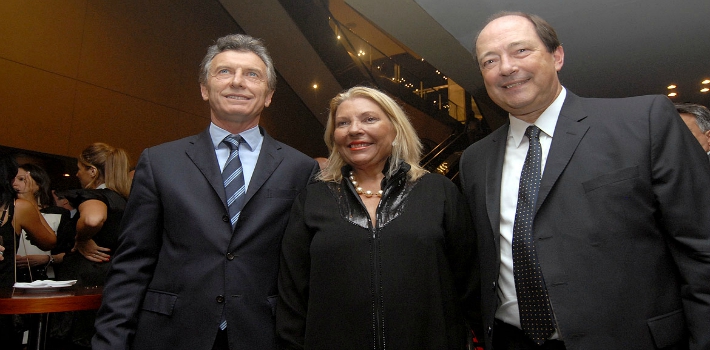
Español“Argentinean Airlines and [the oil company] YPF will remain under state control.” These were the words of a certain candidate who will vie for the Argentinean presidency next December.
The statement could have easily come from Daniel Scioli, the man President Cristina Kirchner has chosen to succeed her. It would be a logical guess.
Die-hard government supporters have always been suspicious of the governor of the massive province of Buenos Aires, home to 37 percent of the country’s voters. While his loyalty to Kirchner has been questioned, his vice presidential running mate Carlos Zannini — a former Maoist-guerrilla, who local media have described as secretly working for Kirchner — will attempt to keep him in check.
No, the words were actually spoken by Mauricio Macri, the mayor of Buenos Aires and the favorite to emerge victorious from the opposition primaries. Macri has made a radical about-face in rhetoric recently, praising and even pledging to continue many of Kirchner’s most emblematic policies.
Leaving behind his promise to end foreign-exchange controls his first day in office, the word “change,” which previously dominated his speeches during the first half of the year, has vanished from his discourse.
While some may be surprised, why should we expect anything different?
This metamorphosis in rhetoric occurred after the Pyrrhic victory Macri secured in mid-July in the local elections in Buenos Aires, the district where he has ruled for the last eight years and developed as a stronghold for his PRO party. The narrow margin of victory was a shock, a humbling experience. It revealed something many wanted to ignore: Macri does not embody change; he’s just another politico.
Maybe it’s his origins as a businessman (even though it was the sort who receives privileges from the corporatist state), or his past as the head of one of the most popular soccer teams in the country, that explains why Macri has managed to dazzle a large chunk of the population that considers itself “anti-Kirchner.”
But behind the tailored words by political marketing experts, Macri is no different. If one were to build a concept map of Macrista ideology, many similarities with the current government would emerge.
They will deny it. “Mauricio Macri does not come with an ideology,” said Marcos Peña, general secretary of the Buenos Aires government and Macri’s right-hand man. But the lack of ideology is itself ideological, and Macri is no different than the other candidates.
Like the ruling party, opposition candidates see themselves as the masters of other people’s will. Every candidate in this election represents the same vision of citizens as serfs — vassals of the crown.
According to this view, the individual is merely a cog in the machine that is constructed to achieve the goals of those in power. In fact, Macri’s slogan for Buenos Aires should leave little doubt: “You are in everything,” reads every official propaganda piece from his campaign.
Cliches such as the defense of “national industry,” the common good, or the well-being of “the Argentineans,” are chimeras that politicians love to talk about. Macri is no stranger to them. A document disseminated among Macri’s PRO officials only reinforces this idea. “He has always believed in a very active role for the state, and his eight years in office proves it,” notes the memorandum.
His supporters are instructed to defend welfare-state programs, such as the Universal Child Benefit (a sort of Universal Basic Income), nationalized companies, the nonviable social-security system, and other initiatives that have defined the Kirchner era.
What the Argentinean opposition is promising is more of the same, only “better managed.” They plan to continue all the same big-government programs, and claim they are up to the task of running them more efficiently. For these politicos, seizing pension funds, restricting foreign trade, or plundering the income of citizens are value-free policies, and their success depends on the qualities of the individual at the helm.
Unfortunately, the political future of our country is bleak. No contender for the presidency has even hinted at dismantling the destructive policies that have been in place for decades. In a country where the personal aspirations have been reduced to buying a new television or an air-conditioning unit, the field is wide open for populism to continue its reign.
 Versión Español
Versión Español













